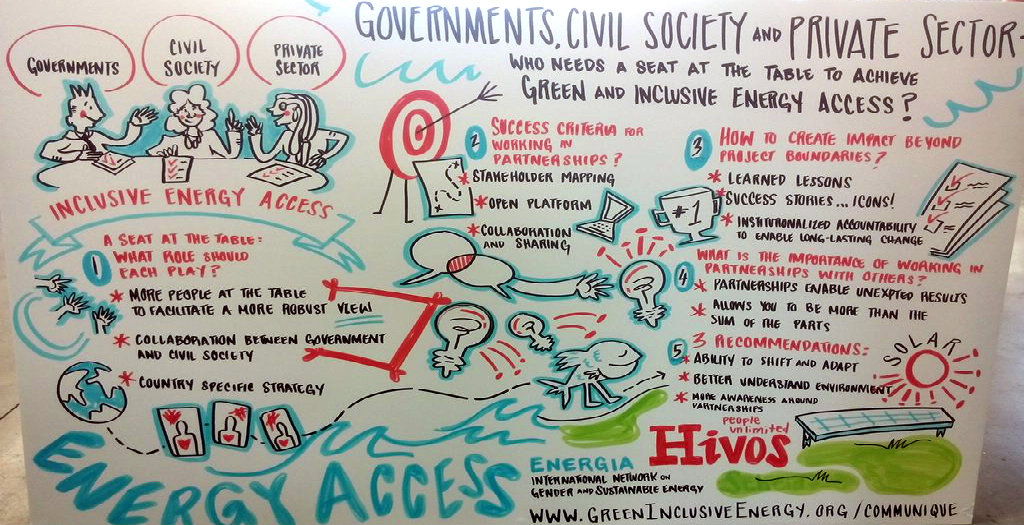Rachel Kyte, Special Representative of the UN Secretary-General, steps on the podium and smiles into a huge hall filled with hundreds of people suited up for the occasion. She takes up the microphone, and and with that simple gesture opens the three-day sustainable energy conference whose title is projected on a gigantic screen above her: ‘Going further, faster together’. In other words, providing energy access for all.
With this image in my head, I made my way – together with my Hivos colleagues – to the Sustainable Energy for All (SEforALL) Forum conference venue in New York. We were prepared to tell our story, host workshops and connect with other participants. Our aim was to form new partnerships because we understand that as a civil society organisation we cannot work in silos if we want to provide people all over the world with affordable, reliable and clean energy – energy that is so important for development. We have to collaborate with governments and private sector. We need policies that favour renewable and off-grid energy, and we need companies that invest in infrastructure and market new energy solutions.
But, we also cannot achieve universal energy access without involving those who we aim to reach. This hit home with me as I gazed at the crowd gathered at the forum. I mainly saw people who hold high positions in governments and companies. On top of it, they were all from Western countries. Where were the representatives of governments and people from countries that struggle with a lack of access to energy? Where were those whose lives changed drastically for the better the moment they had light, clean cookstoves and electricity to power their machines? Don’t these people also need to have a say in their energy supply and use?
Luckily I didn’t have to search long or far. Hivos had invited representatives of our partner organisations, and ENERGIA, a gender and energy organisation we’ve hosted since the beginning of 2016, had in turn invited several of its women entrepreneur beneficiaries. All come from different developing countries, and as this demographic was clearly under-represented at the Forum, our partners and ENERGIA’s entrepreneurs did not go unnoticed! Their stories inspired everyone who listened to them and motivated quite a few to take further action.
Another initiative that became an eye-catcher right away came from Hivos Latin America. They used the clever slogan ‘Data tells, stories count, questions matter’ to challenge the audience to think beyond numbers. The fact is, Latin America might have a high percentage of people with access to energy, but most countries in the region neglect to provide power to those living in remote areas. Our Latin American colleagues likewise represent people who are not often listened to, but this time their stories made it all the way to New York.
When we co-convened the final Hivos workshop together with governments (Netherlands, Nepal and Kenya), members of the private sector (Schneider Electric and Selco India) and fellow civil society organisations SNV and ENERGIA, I was wondering if we’d be able to involve those represented in the ENERGIA and Hivos Latin America initiatives. As the workshop progressed, I observed a growing willingness by the different sectors to collaborate and form partnerships. All participants agreed to work together in achieving energy access. “So far so good”, I thought. We seemed to have reached our objective. But more importantly, the sectors also agreed to put citizens at the centre of energy access planning and implementation. This was an important achievement. Now, it is up to us – civil society – to take this further and directly engage with the people at the ‘receiving end’ of energy access. After all, it’s their stories that really count!










